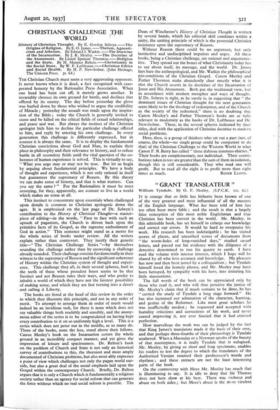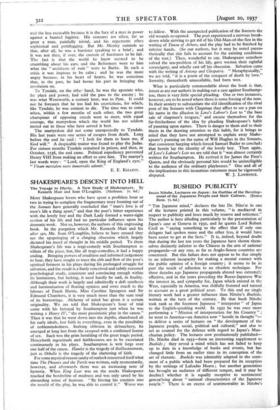IT is strange that so little has hitherto been known
of one of the very greatest and most influential of all the masters of the English language. What has been told of him has too often been mere fable ; and the result is that a largely false conception of this most noble Englishman and true Christian has been current in the world. Mr. Mozley, in this admirable book, has set himself to enlarge our knowledge and correct our errors. It would be hard to overpraise his work. His research has been indefatigable ; he has visited scores of places, and unearthed scores of documents from " the worm-holes of long-vanished days," studied casual letters, and pieced out his evidence with the diligence of a detective determined to run his quarry to earth. I have read the volume with intense interest, which I hope will be shared by all who love accuracy and knowledge. My pleasure has now and then been jarred by a colloquialism ; but Tyndale himself loved the homely phrase, and Mr. Mozley may have been betrayed, by sympathy with his hero, into imitating his little mannerisms.
The full worth of the book can be appreciated only by those who read it, and who will thus perceive the justice of Mr. Mozley's claim that if much remains to be done, he has " carried the study of Tyndale a long stage forward." He has also increased our admiration of the character, learning, and genius of the Reformer. Like most great scholars he was unaffectedly modest ; he requested and accepted with humility criticisms and corrections of his work, and never ceased improving it, nor ever fancied that it had attained perfection. How marvellous the work was can be judged by the fact that King James's translators made it the basis of their own, and that perhaps three-fourths of their phraseology is Tyndale unaltered. When a Macaulay or a Newman speaks of the beauty of that masterpiece, it is really Tyndale that is eulogised. Mr. Mozley, by giving us short and long specimens, enables his readers to test the degree to which the translators of the Authorised Version retained their predecessor's words and rhythms ; and these extracts are not the least interesting parts of the book.
On the controversy with More Mr. Mozley has much that is illuminating to say. It is idle to deny that Sir Thomas does not here show at his best. There was violence and abuse on both sides ; but More's abuse is the more virulent
and the less excusable because it is the fury of a man in power against a hunted fugitive. His censures are often, for so great a man, painfully trivial, and his arguments often sophistical and pettifogging. But Mr. Mozley reminds us that, after all, he was a barrister speaking to a brief ; and it was not then, if ever, the custom of barristers to be fair. The fact is that the world he knew seemed to be crumbling about his ears, and the Reformers were to him what the " architects of ruin " were to Burke. In such a crisis it was impious to be calm ; and he was the more angry because, in his heart of hearts, he was conscious that, in the past, he had borne his part in bringing the revolution on.
To Tyndale, on the other hand, he was the apostate who, for place and power, had sold the pass to the enemy ; he was what Wentworth, a century later, was to Pym. It could not be foreseen that he too had his convictions, for which, like Tyndale, he was content to die. The time was to come when, within a few months of each other, the two great champions of opposing creeds were to meet, with equal courage, the martyrdom which the world has not seldom meted out to those who have served it best.
The martyrdom did not come unexpectedly to Tyndale. His last years were one series of escapes from death. Long before the end he said : " I look for them to burn me, if
God will." A despicable traitor was found to play the Judas. For sixteen months Tyndale remained in prison, and then, in October, 1536, the end came. Political expediency prevented Henry VIII from making an effort to save him. The martyr's last words were : " Lord, open the King of England's eyes." " Vitam mortalem mars immortalis ademit."
E. E. KELLETT.







































 Previous page
Previous page